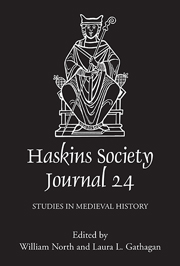Book contents
- Frontmatter
- Contents
- List of Figures
- Editor's Note
- Abbreviations
- 1 ‘Those Five Knights which you Owe me in Respect of your Abbacy’. Organizing Military Service after the Norman Conquest: Evesham and Beyond
- 2 Voluntary Ascetic Flagellation: From Local to Learned Traditions
- 3 The Material and the Visual: Objects and Memories in the Historia ecclesiastica of Orderic Vitalis
- 4 Anonymus Vaticanus: Another Source for the Normans in the South?
- 5 Christian Community and the Crusades: Religious and Social Practices in the De expugnatione Lyxbonensi
- 6 Godric of Finchale's Canora Modulatio: The Auditory and Visionary Worlds of a Twelfth-Century Hermit
- 7 Did Portugal Have a Twelfth-Century Renaissance?
- 8 Internal and External Audiences: Reflections on the Anglo-Saxon Archive of Bury St Edmunds Abbey in Suffolk
1 - ‘Those Five Knights which you Owe me in Respect of your Abbacy’. Organizing Military Service after the Norman Conquest: Evesham and Beyond
Published online by Cambridge University Press: 05 December 2013
- Frontmatter
- Contents
- List of Figures
- Editor's Note
- Abbreviations
- 1 ‘Those Five Knights which you Owe me in Respect of your Abbacy’. Organizing Military Service after the Norman Conquest: Evesham and Beyond
- 2 Voluntary Ascetic Flagellation: From Local to Learned Traditions
- 3 The Material and the Visual: Objects and Memories in the Historia ecclesiastica of Orderic Vitalis
- 4 Anonymus Vaticanus: Another Source for the Normans in the South?
- 5 Christian Community and the Crusades: Religious and Social Practices in the De expugnatione Lyxbonensi
- 6 Godric of Finchale's Canora Modulatio: The Auditory and Visionary Worlds of a Twelfth-Century Hermit
- 7 Did Portugal Have a Twelfth-Century Renaissance?
- 8 Internal and External Audiences: Reflections on the Anglo-Saxon Archive of Bury St Edmunds Abbey in Suffolk
Summary
The quotation will be familiar to many readers. It represents part of the famous writ of military summons directed by William the Conqueror to ÆEthelwig, the last Anglo-Saxon abbot of Evesham, in Worcestershire. The full text reads as follows in translation in volume II of English Historical Documents:
William, king of the English, to Æthelwig, abbot of Evesham, greeting. I order you to summon all those who are subject to your administration and jurisdiction that they bring before me at Clarendon on the octave of Pentecost all the knights they owe me duly equipped. You, also, on that day, shall come to me, and bring with you fully equipped those five knights which you owe me in respect of your abbacy. Witness Eudo the steward. At Winchester.
As is well known, much was made of this little document by J.H. Round back in 1895, and many other scholars have followed in his wake. It is the only scrap of record evidence to suggest that servitia debita were established early in the Conqueror's reign, and it has been made to bear an enormous burden of proof for the so-called introduction of ‘feudalism’ into England. The chaotic cartulary in which it survives has never been published in full, and the Latin text that most historians appear to have used is that produced by Round. Yet, in the five-and-a-half lines it occupies in the 1964 reprint of Feudal England, Round succeeded in introducing not only feudalism but also no fewer than twenty-five errors and misimpressions in his transcription.
- Type
- Chapter
- Information
- The Haskins Society Journal 242012 Studies in Medieval History, pp. 1 - 40Publisher: Boydell & BrewerPrint publication year: 2013

